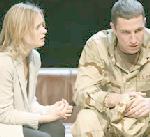SITE GUIDE
SEARCH
REVIEWS
FEATURES
NEWS
Etcetera and
Short Term Listings
LISTINGS
Broadway
Off-Broadway
NYC Restaurants
BOOKS and CDs
OTHER PLACES
Berkshires
London
California
New Jersey
DC
Philadelphia
Elsewhere
QUOTES
TKTS
PLAYWRIGHTS' ALBUMS
LETTERS TO EDITOR
FILM
LINKS
MISCELLANEOUS
Free Updates
Masthead
Writing for Us
A CurtainUp Review
Dying City
By Elyse Sommer
| It was weird. When dad would hit me. Craig would yell at him to stop. But then Craig would hit me a lot too. When I would go tell dad, he wouldn't do anything. And when I would go tell mom she would say, 'go tell your father.'—Peter I'm sorry.— Kelly Oh, you know, everyone has a childhood.—Peter |

Rebecca Brooksher and Pablo Schreiber in Dying City
(Photo: Joan Marcus)
|
Both Stoppard and Shinn overwhelm us with too much of a good thing— Stoppard with an over-abundance of research and lengthy speeches; Shinn with so many issues and dramaturgical tricks that the audience ends up being more impressed by the smartly interwoven personal and world problems than really caring about the characters. That's even though Pablo Schreiber and Rebecca Brooksher give rich, finely shaded performances,
With a full-featured page for you to read all about the Stoppard trilogy (Coast of Utopia notes and reviews), let's have a closer look at what this two hander is about and see what makes Dying City frustrating as well as compelling.
Shinn has created two wonderful acting opportunities. Schreiber plays Peter and Craig, two identical twins. Brooksher is Kelly, the widow of Craig who died under suspicious circumstances in Iraq. For Schreiber this is a chance to show that his much praised role in last year's Broadway revival of Awake and Sing ( review) wasn't a flash in the pan. Brooksher is making an impressive New York debut. Her Kelly has you waiting for the tension beneath the calm exterior to explode and yet when it comes, it takes you by surprise.
There are a lot of conflicts that get unraveled in the play's short, tense scenes, fluidly directed by James Macdonald: The circumstances of Craig's death; his mental state and the state of the marriage when he left for Iraq; Peter's need to maintain a connection to Kelly in order to come to terms with and understand his brother's death.
The action begins in 2005 in Kelly's sparely furnished New York apartment where she is packing books into boxes, apparently preparing to move. When the buzzer rings, it's Peter, his arrival unannounced and clearly not especially welcome.
Shinn packs a lot of information into his taut dialogue, with much subtext left for the actors to fill in with their facial expressions and body movements. And so, bit by bit, we learn a lot about the brothers, and Kelly and the parental influences and social and political zeitgeist that shaped them.
A gun-loving, easy with the blows Vietnam veteran spawned two very different sons — one intellectual but following the father's tough macho soldier path; the other a sensitive gay man who has become a moderately successful actor. Coming from a more prosperous background, didn't spare Kelly from the psychic fallout of having an emotionally unavailable father. It also played a big part in her relationship with Craig whom she met at Harvard while enrolled in a psychotherapy program and R.O.T.C. was financing Craig's studies for an academic career.
The identical twin angle enables Shinn to ricochet back and forth between the 2005 Kelly and Peter scenes and the ones a year and a half earlier which bring the dead Craig into the picture. Thus, with a simple costume change and two walkways at either side of set designer Anthony Ward's slowly rotating square parquet platform (one leading out of the apartment and the other to the bedroom and bathroom) Schreiber can effortlessly switch from Peter to Craig and back.
It's fascinating to see Shinn apply the title concept to New York after 9/11 and to Baghdad during the war that followed and weave global concerns into the tricky psyches and relationships of his three characters. You can't help but admire his effort to lasso so many themes into this slim play and the way he has fit in apt details like Peter's being in New York playing one of the sons in O'Neill's Long Day's Journey Into Night, a family drama that out-dysfunctions his own background. On the other hand,even before the set completed its almost unnoticeable full turn, I found myself realizing that all this clever encapsulation came at the cost of my feeling fully engaged because these characters were too often mouthpieces for the playwright's reflections about the world we live in.
Links to Other Christopher Shinn Plays Reviewed at CurtainUp Four
On the Mountain
What Didn't Happen
Where Do We Live
|
DYING CITY Christopher Shinn Directed by James MacDonald Cast: Pablo Schreiber and Rebecca Brooksher Sets & Costumes: Anthony Ward, Lights: Pat Collins Sound: Aural Fixation Running Time: 90 minutes without intermission Mitzi E. Newhouse , 150 W. 65 St.www.lct.org 212/239-6200 From 2/15/07; opening 3/04/07 Tues through Saturday at 8pm, Wed and Saturday at 2pm and Sunday at 3pm Tickets: $70-$75 Reviewed by Elyse Sommer on March 7th |

Easy-on-the budget super gift for yourself and your musical loving friends. Tons of gorgeous pictures.

Leonard Maltin's 2007 Movie Guide

At This Theater
Leonard Maltin's 2005 Movie Guide

 >
>

